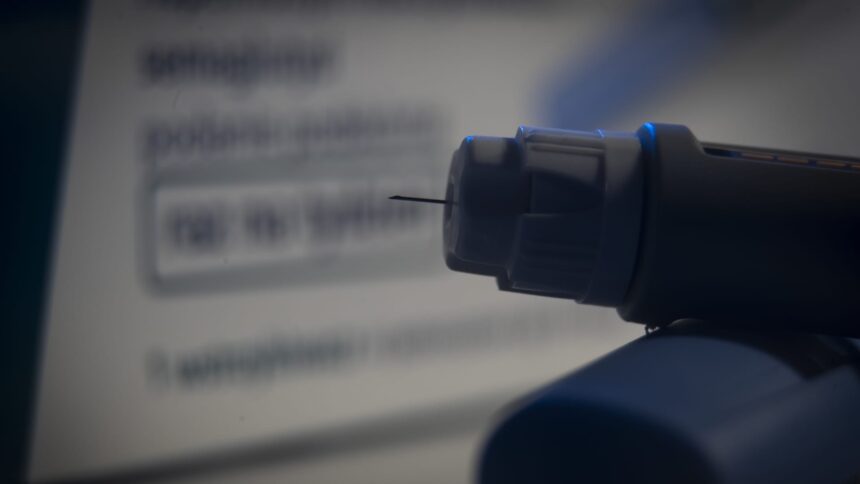Danish biotech Zealand Pharma is targeting the “next generation” of weight loss drugs as competitors pile into a market dominated by heavyweights. Novo Nordisk and Eli Lily.
CEO Adam Steensberg told CNBC Thursday that early-stage trials of an experimental obesity injection show higher weight loss — with less muscle loss and fewer side effects — than traditional GLP-1 treatment. The company is currently looking for a global pharmaceutical company to partner with, he said.
“Our focus is really what we need in the 2030s, and it’s really about creating, you could say, the next generation of molecules that are not based on GLP-1,” Steensberg said.
Last month, Zealand Pharma announced positive results from a phase 1b trial for its weight loss drug, a dual GLP-1/GLP-2 receptor agonist called Dapiglutide. Putting the company head-to-head with major obesity players Novo Nordisk and Eli Lilly, whose GLP-1s Wegovy and Zepbound, respectively, have exploded in popularity for their weight loss effects.
However, Steensberg said that it is the company’s separate obesity drug candidate, Petrelintide, a long-acting amylin analog, that can differentiate it from the competition, offering an alternative for users who cannot tolerate GLP-1.
“It’s what we call the crown jewel. It’s one of the highest expectations,” Steensberg said.
“We have a very strong feeling that this could be a foundational therapy in the future – something that provides the weight loss that patients are looking for but with the potential for a better tolerability profile,” he said.

Zealand Pharma.
Amylin analogs are a new form of weight loss treatment. They work by mimicking the hormone secreted with insulin in the pancreas to increase satiety. This is different from GLP-1 agonists, which mimic incretin hormones produced in the gut to suppress appetite and regulate blood sugar.
“These are two very different human experiences,” Steensberg said, comparing GLP-1 to an amylin analog. “If you work on satiety, it will be a more pleasant experience. So if you get it, you can stay longer (in) treatment.”
Novo Nordisk is also experimenting with its own version of the treatment, combining the GLP-1 component Semaglutide with the amylin analog Cagrilintide in a candidate called CagriSema.
In June, Zealand Pharma also announced positive results from a phase 1b trial of Petrelintide, which showed that a course of 16 weekly injections reduced body weight by 8.6% on average.
The company said the findings show “strong support” for the drug’s potential as an alternative to GLP-1. After the biotech company’s first-half results in August, Steensberg upped the ante, saying amylin analogs have the potential to be the “backbone therapy of the future for weight management.”
“If we can develop a molecule that gives patients the weight loss they’re looking for with a mild tolerability profile, and we can also show a reduction in risk when it comes to cardiovascular health, I have every reason to believe it could be a first-line therapy,” Steensberg told CNBC in interview Thursday.
Looking for a global pharmaceutical partner
Zealand Pharma, which was founded almost three decades ago with a focus on peptide-based medicines, has seen ups and downs in recent months as it has ventured into obesity treatments. So far this year, the stock price is up more than 110%.
Competition in the sector is fierce, but Novo Nordisk and Eli Lilly still dominate the market as their so-called miracle drugs become essential to consumers around the globe.
Several drug regulators, including those in the US and the European Union, have now expanded the labeling of GLP-1 drugs for use in the treatment of obesity-related comorbidities and other diseases. This is because concerns remain over the side effects of other drugs, such as muscle loss and suicidal thoughts, and the US authorities refuse to pay for the treatment.
Syringes of weight loss drugs “Wegovy,” “Ozempic” and “Mounjaro.”
Image Alliance | Getty Images
However, the appetite for treatment continues to grow, analysts estimate that the sector could reach $200 billion by 2030.
Emily Field, head of European pharmaceuticals research at Barclays, said the weight loss market is likely to grow more “fragmented” over time as pharmaceutical companies target different segments, noting that treatments to counter muscle loss can be a good way to “differentiate.”
However, he noted that a company of Zealand Pharma’s size and scope would struggle alone.
“It’s not something Zealand can even think about, Manufacturing alone. Many people who have had it still have it, but wonder if it will buy or not,” said Field by phone.
Steensberg on Thursday dismissed growing speculation about a takeover, saying it was “definitely not part of our plans.” But he noted that despite raising a significant $1 billion in capital earlier this year, the company needs partners.
“We have a clear ambition to continue into the next phase of our life as a partner company,” Steensberg said. “We have a lot to offer and I think it’s a great opportunity to partner with Zealand now for a big pharmaceutical company.”
He added that partnership discussions are ongoing and will continue until the first half of next year.
Petrelintide and Dapiglutide will now advance to phase 2 trials in overweight and obese patients in late 2024 and the first half of 2025.




